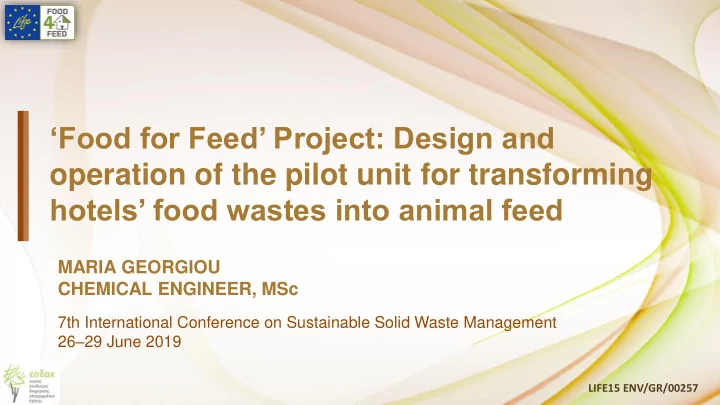

‘Food for Feed’ Project: Design and operation of the pilot unit for transforming hotels’ food wastes into animal feed MARIA GEORGIOU CHEMICAL ENGINEER, MSc 7th International Conference on Sustainable Solid Waste Management 26 – 29 June 2019 LIFE15 ENV/GR/00257
Briefly about F4F Project The F4F project is a demonstration project aiming to evaluate, through a pilot scale realization, an innovative, simple technology and low emissions process that allows the safe transformation of source separated food wastes, mainly from hotels (and generally from the hospitality industry and restaurants), into animal feed, utilizing an altered solar drying process.
Project beneficiaries Association of Solid Waste Management of Crete 01 (ESDAK, coordinator) 02 Agricultural University of Athens (AUA) Modern PowerPoint Presentation 03 Free University of Berlin (FUB) 04 Harokopio University of Athens (HUA) Modern PowerPoint Presentation 05 Hellenic Mediterranean University (HMU)
Some more info… Duration Budget 2.580.619,00 € 01/09/2016 – 28/02/2021 Funding Location 60% EC co-funded Heraklion Crete
Key Actions Design of the Design, construction and Evaluation of collection scheme operation of the pilot unit the product
Support Actions Technical scale Customer Economic, F4F as Part of Dissemination up, design and the EU’s survey environmental activities construction evaluation Wastes Strategy manuals Target groups Development of Website, Social Detailed technical Versatile actions to Pet owners business plan media accounts designs explore F4Fpotential Assess the Pig & poultry farmers Leaflets Construction and as part of EU Feed producing environmental Informative events operational manuals policies and industries impact Open days strategies Pig & poultry farm Conferences product consumers Work shops
Collection scheme • Evaluation of source separation systems of 24 hotels • Selection of 4 hotel Creta Maris Beach Resort Galaxy Hotel Aquilla Atlantis Hotel Olive Green Hotel • Composition analysis of food waste • Design optimum collection route •
Collection scheme • Supply of indoor bins (70lt) • Supply of road bins (240 & 360lt ) • Collection with refrigerator truck (T <10o C) • Transferring to the Pilot Unit (within max 4 hours)
In the center of the study area Proximity to the highway Easy access to infrastructures (for electricity and water supply) Easy disposal of the residues of the process into the bio-drying unit Location of the pilot unit
Layout of the pilot unit 1. Truck parking area 2. Temporary storage area of the bins 3. Conveyer belt 4. Shredder , Mono-pump 5. Solar drying halls (stainless steel) 6. Product collection area 7. Temporary storage area of the product
Construction of the pilot unit Total area of the pilot unit: 880m2 Total pilot unit area: 468m2 Solar drying greenhouse 384m2/ pretreatment unit 84m2
Equipment installation • Conveyer belt • Shredder • Monopump • Under floor heating system • Horizontal and vertical turner • Solar panels
Pilot unit flow chart Impurities Shredding Hand sorting Food waste Drying/ Pasteurization Produced feed
1 st operational period Pretreatment unit
1 st operational period Solar drying unit
1 st operational period The final product Samples send to partners for trials
1 st operational period Operational data • Operation between July-October • Collected and treated food waste about 150tn • Daily average amount of incoming food waste for process 850 kgr • Floor temperature in the drying halls about 40-45 o C • Estimated that for drying period about 8 days, the moisture content reduced from 70% to 10-15%
1 st operational period Problems encountered in the collected food wastes
1 st operational period Problems encountered in the collected food wastes
1 st operational period Problems encountered in the collected food wastes
1 st operational period Problems in the operation under floor heating lifting of the bins shredder system
2 st operational period Actions for the optimization of the operation Installation of Pulverizer
2 st operational period Actions for the optimization of the operation Installation of a heating pump and 4 more solar panels
2 st operational period Actions for the optimization of the operation Installation of a hydraulic lifting system for bins
2 st operational period Other actions for the optimization of the operation Installation of air curtains Mechanism for at the two doors of the pressure washer automatic door pretreatment unit machine closing
Evaluation of the product • Physicochemical analysis of the product • Microbiological analysis of the product • Animal feed trials with cats, dogs, broilers and fattening pigs • Blood tests of the animals participated in feed trials • Evaluation of the commercial value of the product
Contribution of F4F project to EU objectives within the framework of waste management and circular economy ▪ Source separation of food wastes in the hospitality industry ▪ Development of an optimum collection scheme of food wastes ▪ Production of a product with possibility of use as part of animal feed through an environmentally friendly process ▪ Diversion of food wastes from landfills ▪ Public awareness regarding the need of source separation of food wastes
Thank you https://life-f4f.gr/ http://ec.europa.eu/environment/life/ LIFE15 ENV/GR/00257
Recommend
More recommend